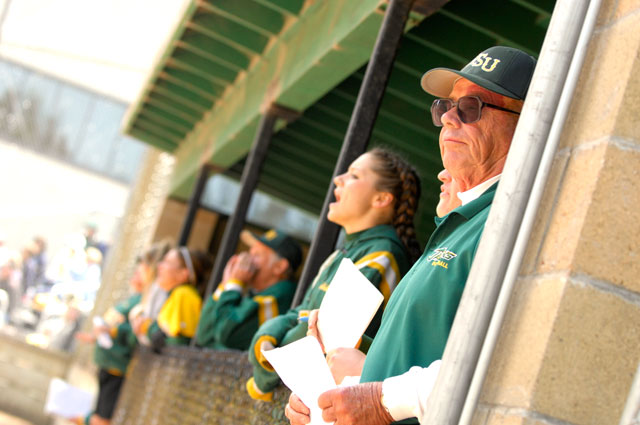
When former the marine first started coaching softball, he had minimal experience in two key areas. Though Cheek had been exposed to fastpitch softball in the military and dabbled in coaching baseball years ago, he was much less knowledgeable regarding the larger ball. And his involvement in coaching women was limited to parenting his 15-year-old daughter, Teresa.
Twenty-six years later ¬– the last 21 at the helm of Humboldt State’s NCAA Division II softball program – Cheek is better prepared in both areas. Practice runs smoothly, every minute on the field efficiently employed, and the women under his command respond quickly to their mentor’s sharp directives.
“Unfortunately for the women, I brought a drill sergeant approach to coaching softball,” Cheek remembers. “Let’s just say I made a lot of mistakes. But I’ve made a lot of adjustments since then.”
What hasn’t changed is the discipline and work ethic he brought to HSU softball from the beginning. The result has been 17 conference championships, 18 appearances in the West Region tournament, five regional titles and two national championships.
“The successful players in his program are disciplined and the pressure he puts on them in practice is so intense that the game seems easy,” said College of the Redwoods head coach Maggie White, who played for Cheek for four years in high school and four more at HSU before serving a stint as his assistant coach. “Not all players can play with this pressure. It takes a certain mental toughness to play at HSU. He attracts talented athletes that are also mentally tough or they do not make it.”
The 2008 Lumberjacks proved to be one of Cheek’s toughest groups, bouncing back from a first-game shellacking in the NCAA Division II West Region to win that tournament and advance to nationals in Houston. All-American pitcher Lizzy Prescott displayed that mettle in tossing a 17-inning, complete game, 1-hitter against Lock Haven University in the national semifinals, striking out an NCAA-record 22 hitters in the 1-0 victory. HSU finished the season with a 10-game winning streak, crowning it with a 1-0 win over Emporia State in the national championship game.
The 2009 team struggled through ups and downs, by Cheek’s standards, but still ranked No. 1 in the west most of the season and was listed among the nation’s top 10 all year. Heading into the 2010 season, the goal of a national championship remains the primary focus, something the Jacks first achieved in 1999.
One of the players on that ’99 squad was All-American third baseman Shelli Maher-Sarchett, who is currently in her fourth season as Cheek’s assistant coach. Having achieved national titles at HSU as both a player and coach, Maher-Sarchett has a unique perspective on her boss’ approach to the game.
“Coach Cheek and I play good cop, bad cop. Coach has told me that I am there to soften things up,” Maher-Sarchett said. “It is like I am feeling the emotions of myself and the 22 other young ladies. I feel for them just as much as I feel for myself because I have been in both situations.”
Cheek’s successful run at softball at HSU coincided closely with his greatest disappointment, the termination of the Lumberjacks’ wrestling program. During 20 seasons as head wrestling coach, Cheek saw his athletes win more than 250 matches, and 46 of them achieved NCAA All-American status. Five Lumberjacks claimed individual national championships, leading to Cheek’s induction into the California Wrestling Hall of Fame.
Meanwhile, softball at HSU had fallen by the wayside, and the program was discontinued following the 1983 season. At the same time, Cheek took on head softball coach responsibilities at Arcata High School in order to help his daughter realize her dream of playing college softball. Together they led the Tigers to four league titles and four appearances in the section tournament.
In 1989, Humboldt State revived its softball program, naming Cheek head coach. Only a year later, with budget cuts looming, the Lumberjacks discontinued wrestling, leaving Cheek downhearted and discouraged. But instead of dwelling on the negative, he turned his focus to the softball field, and with a standout sophomore pitcher named Teresa Cheek in the circle, Cheek led the Lumberjacks to their first-ever appearance in the NCAA tournament in 1990.
Humboldt State softball continued to prosper through the 1990s and into the new millennium, bringing with it annual expectations of dominance. That dream-like reality was nearly shattered in 2005, however, when Cheek suffered a heart attack that nearly cost him his life. Contrary to his physician’s advice, Cheek returned to work within days of his release from the hospital, and was back on the field a short time later.
Honors have been abundant and milestones are reached on a regular basis these days, including Cheek’s 1,000th win at the helm of the Lumberjacks, achieved this spring.
Now 71 years old, another benchmark approaches, one that Cheek has examined annually for the past six years. Will this season will be his last?
“I love what I’m doing,” Cheek said. “My daughter wants me to keep coaching, and my wife wants what’s best for me. And I feel like I’m a vital part of this program. I’ve watched the program grow, and want it to keep on that path.”
Semper Fi. Always faithful.